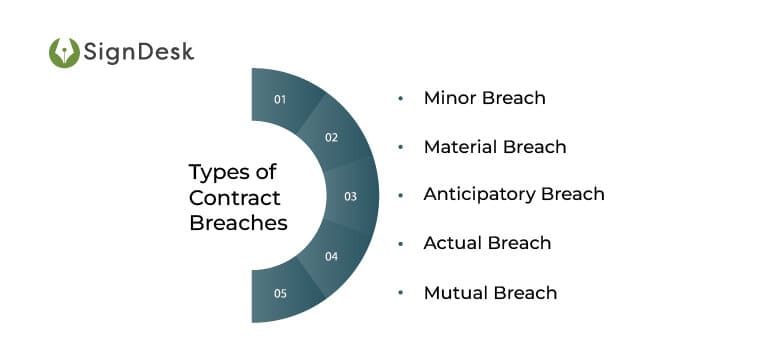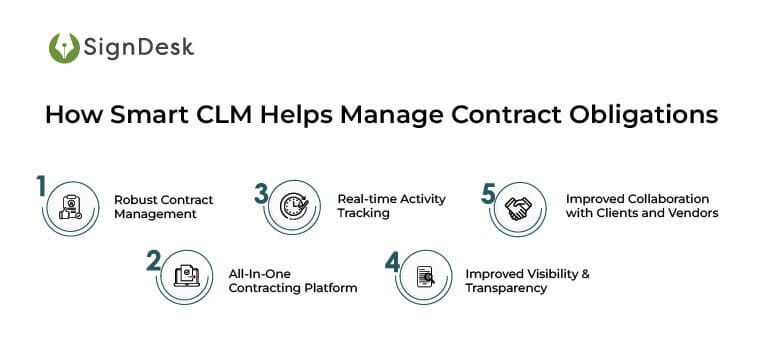Breach of Contract – What is it & How to Avoid it?
Many businesses handle a multitude of contracts on a large scale, and breaches of contracts often lead to unsuccessful deals. The challenge lies in efficiently managing these contracts and their terms and conditions.
Enter smart contract lifecycle management (CLM), a modern solution that simplifies contract tracking by automating obligation management. With the assistance of AI-Powered CLM, you can easily steer clear of contract breaches.
This CLM software offers real-time updates on contract obligations and ensures contract deadlines are met. This empowers your business teams to proactively prevent contract breaches and uphold their contractual commitments.
What is a Breach of Contract?
A contract is a legally enforceable agreement that establishes, specifies, and dictates mutual rights, obligations, and consequences of non-compliance among its parties.
A breach of commercial contracts occurs when one party fails to uphold their end of the deal without a valid legal excuse. This breach can happen for various reasons, such as late payments, faulty products, or more serious violations that lead to damages.
A breach of contract can happen anytime without the firm’s realization or intention. Failing to deliver on agreed-upon terms and conditions can cause a breach of contract relating to untimely payment or delivery, flawed products, or any serious violation causing damages.
Parties causing a breach of contracts are required to pay for the settlement to the aggrieved party as enforced by Contract Law within the jurisdiction of the contract.
How Does Breach of Contract Affect Businesses?
Many sectors including BFSI, pharmaceuticals, IT, education, retail, manufacturing, construction, real estate, travel, and hospitality management deal in bulk contracts. All these sectors manage their contracts in a traditional way that is quickly becoming outdated.
Without proper management, the firms face many challenges due to breach of contracts. The breaches often lead to unsuccessful business deals causing additional damages:
- Non-Compliance Fines: Non-compliance with legislation is a costly process that severely affects firms charged with breach of contract cases. According to Contract law, the breaching party needs to pay the amount mentioned in the contract as compensation for violating the conditions.
- Loss of Reputation: When an organization encounters a breach of contracts, it faces the risk of a loss of reputation. Loss of reputation is directly proportional to business loss as it affects the trust and good faith of clients. With a bad reputation, it’s difficult to onboard new customers or maintain existing relationships.
- Revenue Loss: With the non-compliance penalty charges the organizations face overall revenue loss that decreases annual revenue and hampers business growth, productivity, efficiency, profitability, and the overall health of the business.
Types of Breach of Contract
There are four main types of contract breaches. The breaches are categorized based on circumstantial, substantial, serious, & conditional contractual terms and the nature of the agreement.

Here, the breaches are considered trivial. This type of contract breach does not meet a few minor requirements such as timely delivery, proper product, or service delivery. In minor breaches, contractual terms and conditions are violated by late delivery, delayed payment, and flawed products or services. Minor breaches occur when any party specifies the time, or any special service and the other party fails to fulfill part of the obligations.
This type of breach involves key elements of the contract; breaching these conditions can cause extreme consequences or even lead to the termination of the contract. Flawed products or missing products or mismatched products can cause material breaches.
Anticipatory breaches are renunciatory breaches where one party knows in advance that it might not be able to perform the promised obligations and there is an unequivocal indication that it won’t fulfill the conditions.
Here the breaching party is not directly violating the terms. The breaching party or the aggrieved party can terminate the contract in advance in this predicament. The breaching party might have to pay compensatory damages for non-performance.
An actual breach is when one party fails to fulfill its obligations completely.
The aggrieved party chooses the best course of action and proceeds with it. After the actual breach happens, there are a few way remedial procedures, including:
– Drafting a new contract
– Settlement through the consequential remedy mentioned in the contract
– Contract termination
– Lawsuit for compensation
– Altering the terms and conditions
Mutual breaches are when both parties decide to terminate the contract for the common benefit and nullify the terms of the contract. This can be a financially or socially motivated decision that can benefit the parties involved.
Reasons for Potential Breach of Contract
There can be various reasons behind contract breaches. These can be circumstantial, substantial, fundamental, serious, conditional, or warranty-related. The terms and conditions should be properly mentioned in the contract in order to support the statement of contract breach. In short, a contract should exist to be breached.
A breach of contract can happen for a number of reasons.
- Poor Contract Management Practices
Business contracts are different from individual contracts. Business organizations deal with contracts on a large scale and without proper contract management. Therefore it is difficult to keep a track of the contractual terms and conditions. Deadlines can be missed without prior knowledge or the wrong type of data could be included in a contract due to human errors. Additionally, contracts may be lost or misplaced, leading to friction in obligation fulfillment. In many other cases, minor breaches happen due to trivial misinformation.
There are different verticals handling the obligations that need to be performed to make a successful contract. Proper coordination is required between all parties involved and the departments providing services. Without seamless collaboration, it’s hard to manage all departments and information scattered across an organization and contract practices are eventually delayed.
Many breaches happen due to miscommunication between business and legal teams. This leads to misunderstandings causing a lack of insight into the terms and conditions of the contracts. Due to poor communication between departments within the business organization, obligations can be missed and ultimately not delivered.
In the traditional method of contract management there is no contract tracking facility that provides updates about the contract. Without monitoring, it’s easy to miss certain details about a contract such as a deadline for delivery or payments.
Consequences and Legal Remedies for Breach of Contract
The consequences of breach of contract can lead to a bad reputation of organizations, broken relationships with business partners, inconvenience and grievances from the aggrieved party, unsatisfied customers and dealers, lawsuits, and compensatory penalties under contract laws along with termination of the contract.
A breach of contract is only valid when the terms and conditions are properly mentioned in the contract and proved to be violated by those terms. A plaintiff has to bring the case of a breach without misinterpretation, alteration, or fabrication. A remedy is only available when the terms are mentioned properly.
In a standard contract, a section of consequential damages exists and provides a solution if breaches happen. Legal remedies are there to solve the case if the two parties cannot settle the matter between themselves. Here are some of the consequences of breach of contracts:
- Compensatory Damages: Normally, contract breaches are solved with general damages which include monetary compensation. Special damages or consequential damages are levied when some unpredictable circumstances appear. But the aggrieved party must prove the existence of such damages in the contract to obtain the incurred loss.
- Injunction: An injunction is an act of special performance in the negative contract where the court orders the breaching party to perform or not perform some special duty as demanded by the non-breaching party.
- Rescission: The non-breaching party has the right to contract annulment in Rescission and can refuse to deliver their part of the obligation without suing or seeking compensation.
- Quantum Meruit: The party can claim quantum meruit when it is prevented from finishing the contract as some reasonable remuneration for the part of services he already performed.
While all these remedies indicate the instant solution for breach of contracts, they do not provide a permanent remedy. Smart Contract Lifecycle Management provides a long-term solution for breach of contracts by enabling businesses to better manage their contracting practices and track their obligations in real time.
How Smart CLM Helps Manage Contract Obligations
A smart contract lifecycle management can help business organizations evade legal complexities by providing regulatory compliance within an efficient digital framework.

- Robust Contract Management
Drafting a robust clear contract is the first step for all successful business contracts. In a smart contract lifecycle management system, the tool automates the process of contract management from creation to termination or renewal.
Clauses are drafted instantly using templates or an AI wizard. Business teams can request contracts and follow-up on drafting & approval. The software provides an easy and fast way of collaboration and negotiation where both parties feel safe, state their terms and conditions openly, and reach an agreement.
- All-In-One Contracting Platform
CLM manages the contracts of the business organizations efficiently and effectively keeping all data safe and secure on a single platform. It streamlines contract collaboration processes and helps organizations maintain low turnaround times and fast operation management.
- Real-time Activity Tracking
Contracts can be monitored at each stage with contract activity and milestone tracking. The deadlines, payments, renewals, and recurring payments are easily tracked and maintained without any delay. Business organizations can keep track of contract details on a smart dashboard and fulfill contractual obligations.
- Improved Visibility & Transparency
With the help of CLM the firms are able to manage huge amounts of contracts in a single platform fast and paperless way. Contracts are organized using a smart contract hierarchy and are stored securely in a centralized repository. There are not any hectic procedures of going through piles of papers and finding the actual contract paper. On the CLM platform, any contract can be retrieved instantly.
- Improved Collaboration with Clients and Vendors
CLM provides a safe platform to the parties dealing in businesses. High visibility for contract stages is maintained and real-time alerts are sent to stakeholders to keep everyone in the loop. Smart CLM helps to build trust and liability among customers, vendors, and dealers by relying on open contract management software.
Pre-empt Breach of Contract With SignDesk’s Smart CLM
SignDesk’s Contract Lifecycle Management tool is a strategic tool that provides leading-edge solutions with real-time compliance with regulations. CLM helps organizations manage their entertainment industry contracts and agreements efficiently and smoothly.
Breach of Contracts is harmful to business organizations, damaging the business reputation. Non-compliance penalty charges impact the annual revenue of the organization slanting business growth. With the help of smart CLM and contract repository, organizations can manage contracts with transparency and avoid contract breaches with contract automation. whether handling an addendum or an amendment.
Never miss a deadline and comply with the terms & conditions of contracts through the smart CLM tool. Book a free demo to start managing your contracts the smart way!
Get a free trial now!